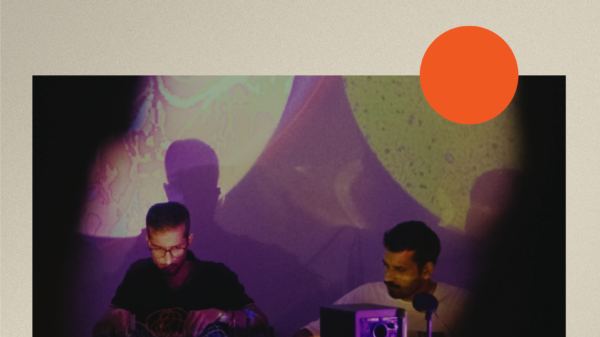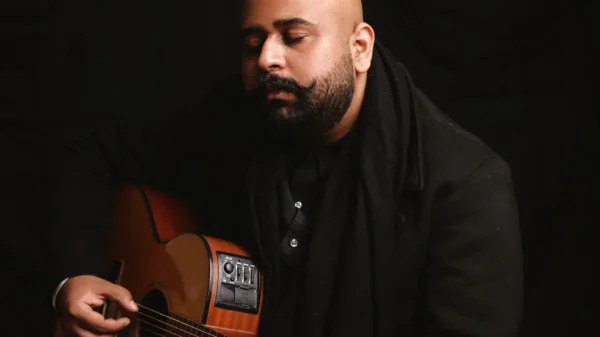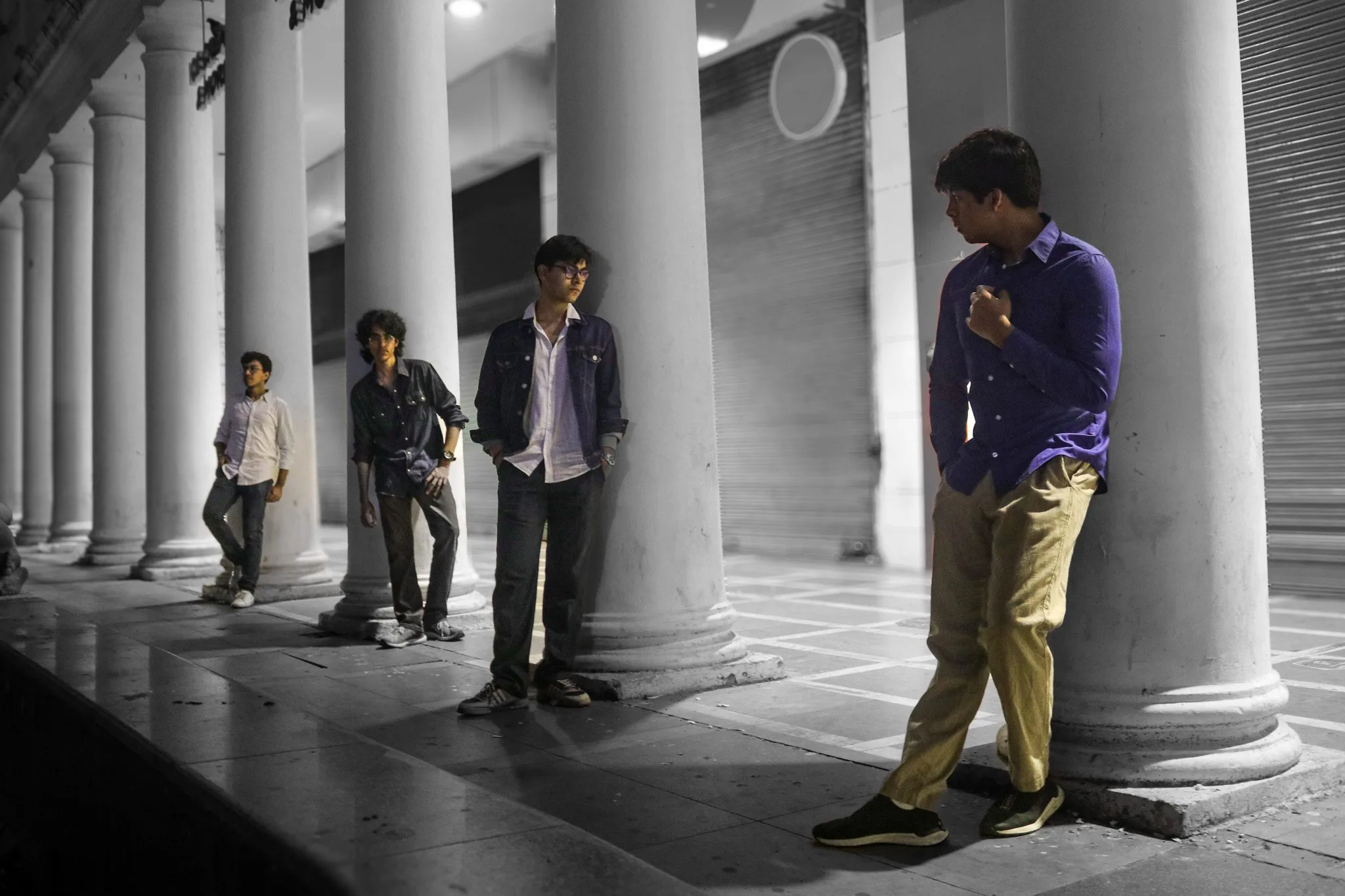Every once in a while, one comes across musical acts that one knows will make something surmountable out of themselves. It is a distinct, marvelous quality that anyone who engages with music at any degree above negligibility can decipher. I was introduced to Delhivision by a friend during my time in Delhi University, and could see the four-person band’s potential. The name had struck me, back then, too — there is something about the city, that has this brutal incisive quality which cuts through layers of epidermis and grief — schadenfreude, enacted by a metropolis onto you and vice versa. It had felt great, to know of one more band that shared that vision of Delhi (pun intended). So far, they are taking it – in terms of grit, passion, and their productive love for rock-n’-roll. They have performed at several respectable venues, opened for Parikrama, released original singles, and gathered praise from industry professionals. It is only forward from hereon.
I talked to the four members — Jaiditya Jha, Priyansh Gupta, Shubhang Munjal, and Aman Suneja about their music, their goals, and their opinions on the city that has turned out to be central to their craft.
1. Tell me a little (member-wise) about yourselves. What made you assume the role you do in the band, what projects have you been pursuing within and outside the band, etc?
Aman : I play the drums in the band. I am doing a bit of vocals now, so you can consider me an upcoming backing vocalist. Outside of the band, I go to the gym. (The other three members try to elucidate to me that Aman is the most technically advanced in the band. Jaiditya is insistent that Aman is an idea, who “on some days is there, and on some days he just is not there.” There is no further clarification from Aman if he agrees with his assigned corporeal state of being.)
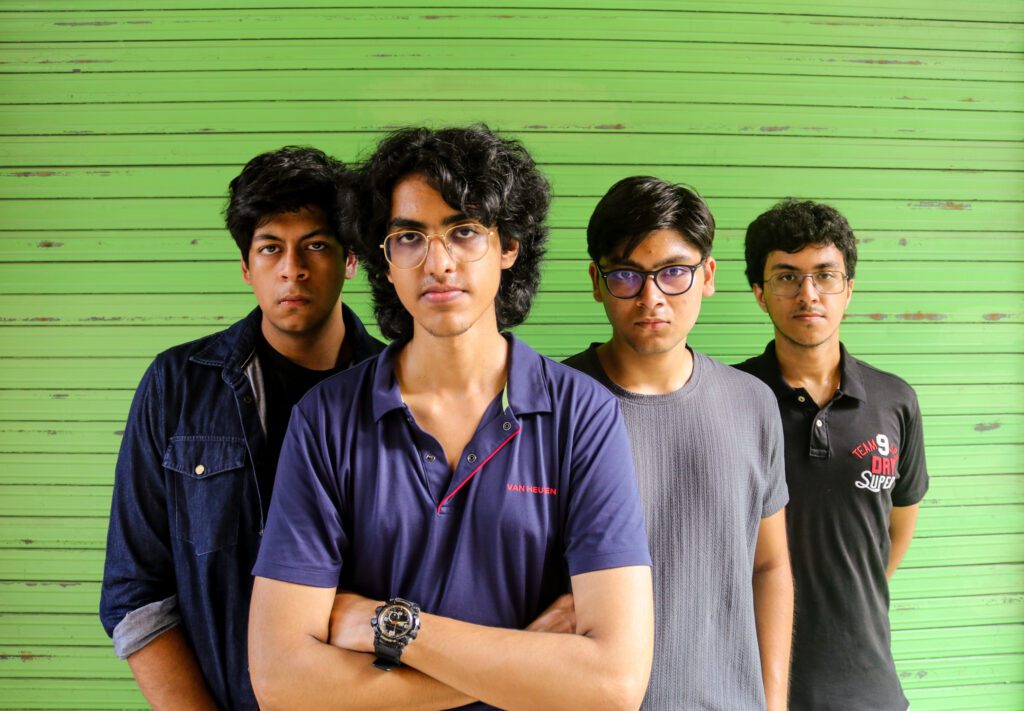
Jaiditya : My name is Jaiditya Jha, I sing for Delhivision and play the guitar. We are a single guitar band, which is somewhat rare for hard-rock bands. Sonically, my foil in the band is Shubhang, because we somewhat occupy the same frequency range. I also have been mixing the releases for the band. I am practicing to play the drums as of late, and Aman has been giving me tips. However, I do not think I will ever be playing them on stage, even though they were my first instrument. Besides working in the band, I like to sleep and I like driving, and I like working on other music. (Priyansh reassures everyone that all of Jaiditya’s solo projects are going to be killer. )
Priyansh : I started as a bassist, got promoted to bassist and backing vocalist. Recently I got further promoted to bassist, backing vocalist, and co-vocalist on the songs. I am basically the one who is doing a lot of the scolding. I am just the one who keeps his temper together. If I had an assignment to ease things out, I would probably do it in the least destructive way. This has manifested into me becoming a communication manager at a lot of events. (Priyansh states that he is a bassist who has his volume higher than other bands. Jaiditya highlights that the former has been “attacking vocals with dogged discipline”, and is the most energetic person on the band.)
[Shubhang disappears mid-call, so the band takes on the responsibility for elaborating on his role in the band. The members state that Shubhang is a full-time Gurgaon resident, indoctrining the band with some Gurgaon-vision, and that they are pretty inclusive as an institution. Shubhang, proficient with cameras, has also manned the drones for their latest video, Drown Me Out, while remaining in frame. The oldest member in the band, he apparently has the most Gen-Z sense in fashion. The drummer returns soon enough, and he is faced with answering the question.)
Shubhang : My role is simple, I play the keyboard. And, that’s it.
Aman : That is what we said. That is exactly what we said.
2. When did the band start, how did the idea come into being that you started to come together as a unit?
Shubhang: In 2022, Priyansh and I went for a badminton game – and he told me that Aman and Jaiditya were playing together — and they were looking for a keyboardist.
Priyansh : Aman and I go way back in time, we have been playing together since we were in 8th grade, together in music competitions, and from there we have had drummer-bassist chemistry, and I have played together since 11th grade.
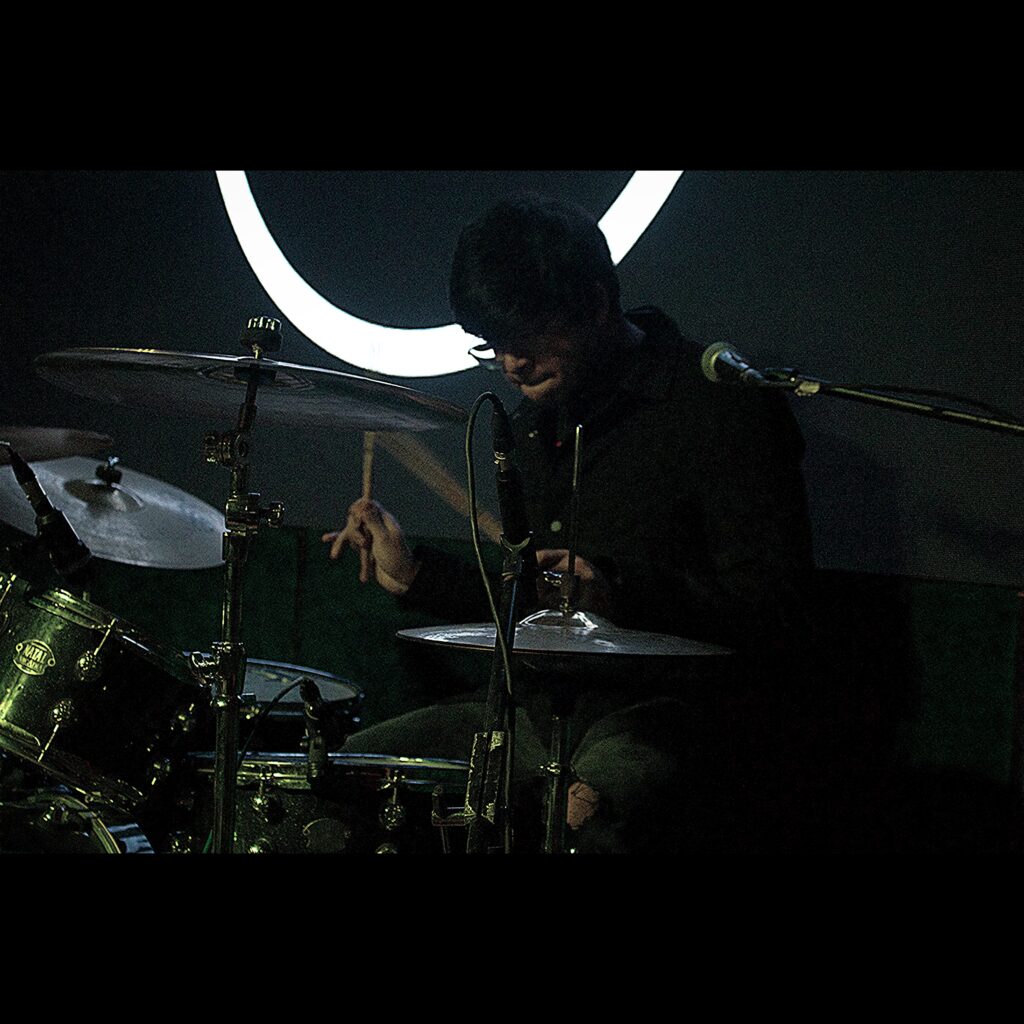
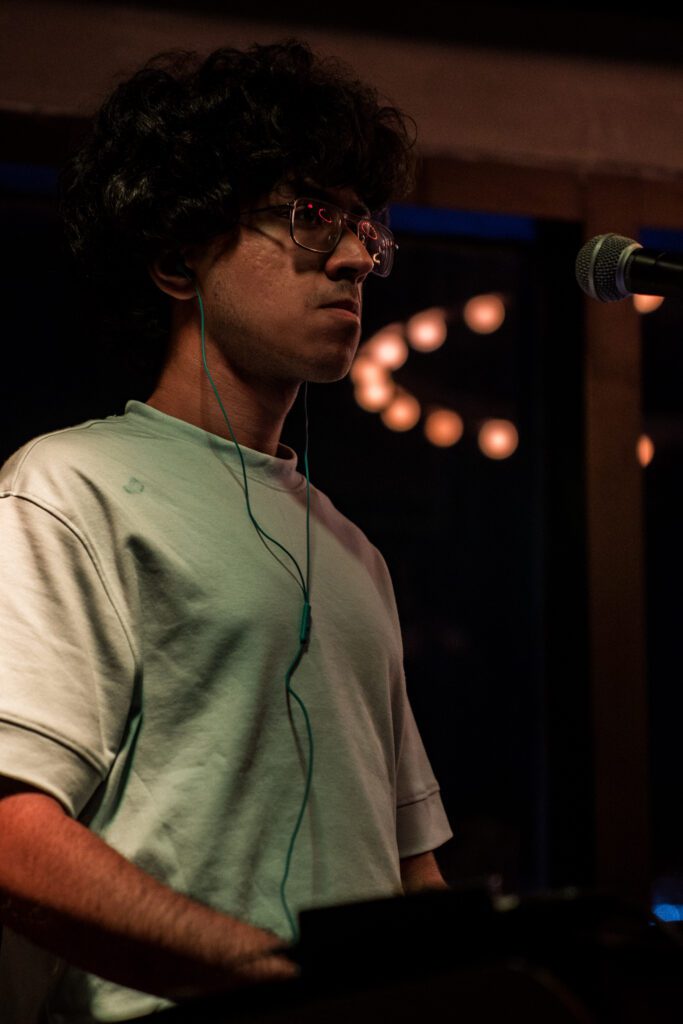
Jaiditya : I pretty much got to know Priyansh because I wanted to play with Aman who lived in the same house as I did, at different points in time. We won’t elaborate further, it sounds cooler this way. Bottomline — Delhivision was formed in October, 2022.
Priyansh: We were simply jamming for inter-school competitions when we realized that this was too big of a thing to let go.
3. Do all of you have separate musical identities — or would you consider them to be converging/similar? How do you come to a coherent but unified identity with your music if you have different influences?
Priyansh : We have very, very, very different musical influences – but we have some mutual interests. Aman and I are into progressive rock and metal. Jaiditya was always into classic rock-n’-roll, and the heavy stuff. Shubhang had heard a lot of Michael Jackson, funk, some classics, 80s’ pop.
Jaiditya: I’d say he has the most agreeable musical preferences out of all of us.
Priyansh : However, we have some preferences which do align us. We have Jaiditya writing the majority and me writing some of the songs. We have some band songs as well, and in these songs we have all of these identities coming together. It genuinely creates something unique, like Punjabi Power is something, which I believe, has never been created. The new song, Hustler, which is about to come out, has progressive rock in there. We even have the Desi hip-hop scene’s influences in there.
Jaiditya : There are touches of avant-garde music. We have some jazzy chords playing in the background. It’s very representative of what we are all into.
4. Your band is named Delhivision, who came up with it, or rather, what is the story of its etymology? How intrinsic do you consider the city’s construction to your own musical identity as a group?
Jaiditya : The short answer is, we wanted Television, but that was already taken. So, we went with Delhivision. The long answer would be that all four of us were born and raised in the capital. (Shubhang interjects that he lives in Gurgaon, and after slight deliberation the band agrees upon being from Delhi NCR).
I think there is a lot of grotesque and very dirty imagery that exists in the city. At least, to me it ties into the concept of rock-n’-roll as a genre. The fact that it is inherently not a very clean genre inherently — everyone is playing very aggressively. There is a degree of grunge to it, not musical grunge — but an element of aesthetic grunge. There is a side to Delhi that really embodies all of that which people have not really associated with the genre yet. I find it very interesting because it is a very rock-n’-roll city in many ways. There are a number of reasons to be angry, to revolt and it all finds a way into our music.
Aman : The condition of the infrastructure of the city in relation to the venues and the business also drives us to be kind of mad.
5. How has the journey been so far? What has the experience been like within Delhi’s music circuit? You have used the word “cannibalistic” in association with the city — how much of it holds true with regards to your time in the city’s music space?
Priyansh : Right now, Delhi’s audience is the problem and the city’s venue owners in general are reciprocating the audience’s reception very poorly. In cities like Goa, Bangalore etc. — they have spaces for experimental music. I have heard that they are infusing sitar with EDM in the background. When it comes to other countries, you have DJs playing their own remixes in their sets. However, in Delhi, if you go to a club, bar, or gathering, you will find them playing classic Bollywood or classic rock-n-roll. There is nothing wrong with playing that, but you will never find anything fresh. Most DJs, you will find, are playing the same old 50s songs smashed into every party. You will rarely find anyone going out of their comfort zone to give the audience something new.
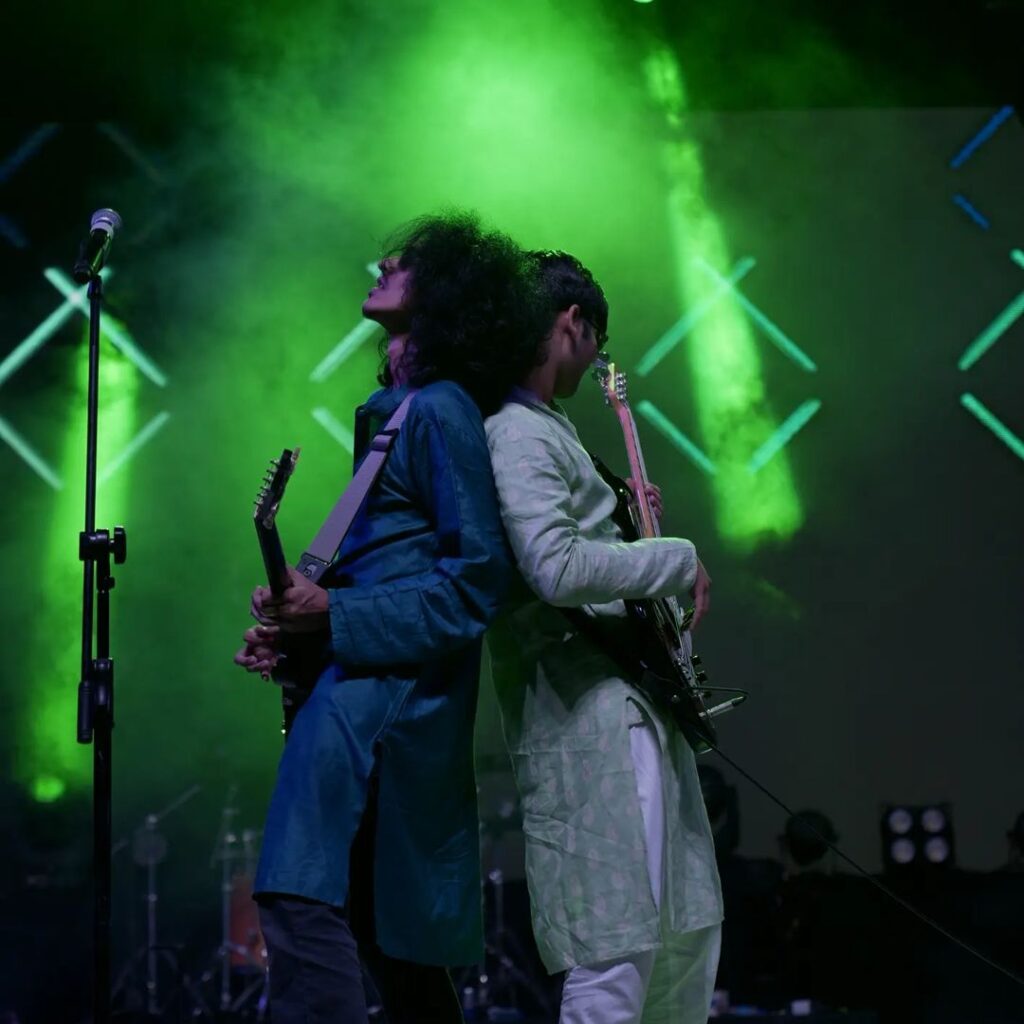
Coming back to the question, the journey has been pretty exhausting for us thus far. While we are inexperienced, people do treat us like kids at times.
Jaiditya : It is very infuriating for us. There are a lot of big egos floating around in the scene, and all four of us had our interactions with them time and again. Priyansh and I handle negotiations, so he has encountered a number of managers who have behaved with us like we do not deserve to play there [in the venues], and that they are doing us a favor by letting us play.
Priyansh : The word favor is important. I do get that they are giving us an opportunity, but in this process, they blatantly disregard the credibility that we are bringing to the table. I understand that they will do that because we are new to the scene. I can almost sense as if it was because of our age.
6. Do you think the city, or the country as a whole, has been accommodating rock acts as a whole — or has it been more of an uphill battle? What are some problems that you have encountered within the Delhi music scene?
Jaiditya: The problem with the scene is that everyone sort of looks at music as something that is entirely personal to them. While there is nothing inherently wrong with that, everyone also thinks that they are entitled to playing a certain kind of music. It leads to people developing a sense of territoriality, and that leads to a lot of older musicians to attempt to gatekeep the scene from a number of younger musicians.
Priyansh : Accommodating rock acts is something everybody would like to do in spirit. Practically, it rarely manifests.
Aman : In addition to that, the Delhi music scene is growing. I do feel that certain rock and progressive acts are being accommodated in Delhi. I am not too sure on the venues, where they are being accommodated, but they are increasing. I have seen a number of skilled musicians from outside India come here and perform. Delhi is becoming a place that is becoming lucrative as a city. I think things will go uphill from here, though it will take some time..
7. Delhi University, within itself, and the college music circuit, has a culture of hosting music competitions that have bands facing off against each other —, in which you have participated, how has that been for you, as a group?
Shubhang : Delhi University does not really have a good band competition scene. Band competitions require a lot of heavy equipment, and a number of people who know what they are doing. It is quite a complicated process.
Jaiditya : I have a bone to pick with the way people write songs within the competition circuit. A lot of them are very competition oriented, and there is nothing fundamentally wrong with that. I have seen a number of young musicians like ourselves call their songs as OCs,or original compositions. They are not actually treating their songs as songs. It is almost like they are making the music that they do to perform in these competitions and win the meagre cash prizes on offer.
Also, the general state of these events with their poor sound and infrastructure also demotivates a number of young musicians from pursuing this further.
Shubhang : Many of the bands play the same songs at all these competitions. After some time, it gets boring – and it is not even fun to compete with them. We know their routine, it is pretty much the same concert at different venues.
Priyansh : To the people who are aiming to pass their time with music in college, this is the place ideal for you. For the people who are aiming to build something out of your music, it is completely counterproductive.
8. What would you say, has the rock ecosystem been like? Is it in contrast with the mainstream music business, or do you find yourselves unwelcome?
Priyansh : Unwelcome for sure.
Jaiditya : We don’t know what the mainstream music business is like because we play only rock. That is pretty self-explanatory.
Jaiditya : Even within the rock scene in India, there are layers. There are many bands which are playing covers of Bryan Adams songs, and doing commercial events. That is a different side of the rock scene from what we are in, and there is nothing wrong with it. To be honest, we are not really playing any big fests. It is more about songwriting, getting on stage and improving our sound for us.
Aman : If we like something, we record it, and we put it out. We do what sounds and feels good to us.
Jaiditya : So far, we have been fortunate with all our ideas having condensed into songs that are listenable. However, as Priyansh said, the rock ecosystem has not been very welcoming. There are a few owners, and venues, like The Piano Man franchise and Depot 48 have been keeping the alternative music scene in the city alive. When it comes to event managers, Bluetree is doing a great job and that has been a management firm that has been giving us opportunities to perform at shows. Other than that, people can be a bit jaded. They do not really like new bands.
9. What is your creative process like? Do you follow a specific order or is it more random?
Shubhang : There is an order mostly, but in most cases we just sit and jam, and we compose and play something, and then JJ writes the lyrics when something comes out. If we have somewhat of a song, we work on it.
Priyansh : It is different for every song. There are songs we write as a band, and there are songs that are brought to the jampad as a demo, as someone’s idea. If a certain person’s idea resonates with the rest of the band, and there is nothing to be changed, then that is that. There have been instances where songs have been completely flipped around even when they were written in a band setting. It is more random than ordered, in this case.
Our tracking and production process is more linear.
Jaiditya : There is agreement that the rhythm section needs to be laid down first : drums and bass, then the guitars come in, followed by the keys. Priyansh and Aman do their thing, and then I track the guitars, Shubhang tracks the keys, and then Priyansh and I do the vocals. On the next track, you will hear Shubhang and Aman sing too, and that is something to look forward to.
10. Your latest single, Drown Me Out, is a commentary on class and the city — elaborate to us how that came about.
Jaiditya: The imagery we employed in DMO is very urban. It is a very dark and happening metropolis, at least in the Indian context, that is what Delhi is. It is about the stark divide and the hierarchies that exist within the music scene and in corporate setups. The power dynamics that exist between your employer and you, the employee, can be jarring at times. Everyone is profit-driven to the extent that they are willing to disregard everything that matters to their so–called underlings. It is something that we have seen in the independent music scene. As I mentioned before, there are a number of people looking to get their egos massaged. There are a lot of people waiting to mislead you, make you feel small, not giving you what you deserve. I mean, what you deserve is a subjective thing, but here I am talking about things like late payments. All these things do matter to us, but we have made our peace with it. It does not affect our music, it does not affect our sound. We play music because it makes us happy.
11. What was the experience, shooting the music video? Would you consider yourselves visual thinkers/artists — do you have ideas for future projects where you would want to incorporate specific elements of visuality?
Aman : The music video shoot for DMO was pretty fun but exhausting. We wanted to put in video form, whatever Jaiditya said, in a fast paced music video. We wanted to depict whatever was in the song. We pulled an all nighter, actually, and got all the shots that we needed.
Priyansh : The first, second and third step was just bootstrapped. We bootstrapped the cast because we have a good friend Adhiraj Bhasin (who is also a musician). We did the editing and the production work ourselves.
Jaiditya : We got someone to do the camerawork, but most of the other stuff, we did by ourselves. For the visuals, we wanted to tap into the noir part of the city. We used a few locations at Connaught place, in the N Block where there is a lot of graffiti. There are a few abandoned places there, like a cafe/live performance venue called Hot Mess, which has been closed for the better half of the decade. It was a cool, Gotham city-esque location, and I really enjoyed being there.
Priyansh : We just had a dancer visual going on when we created Punjabi Power. We aspire to create different visuals for all the different songs that we have. But for now, 90% of our focus rests on the audio. As for Hustler, you will see the visuals when it comes out.
12.What are your ambitions for yourself — although that is a broad question, do you have any specific goals for yourself as a band? Do you wish to perform/open for/do something specific that has been a goal for you for a while?
Jaiditya : As of today, when we are recording, Oasis has just reunited. I don’t think they are coming to India, but if they do, then I am going to wage war if any band decides to open for them. By war I mean war, there will be blood. A number of bands really intrigue us, off the top of our heads if Deep Purple is touring in five years time, which I don’t think they will, because they have had a very nice, successful run. Aman and I both like Metallica, but we all know how it went down the last time they came to India. When it comes to Indian bands, we have opened for Parikrama and they have been really great mentors to us. Nitin Malik, the lead vocalist, has really helped me with my voice : he has been a great mentor, and a constant companion and guiding light.
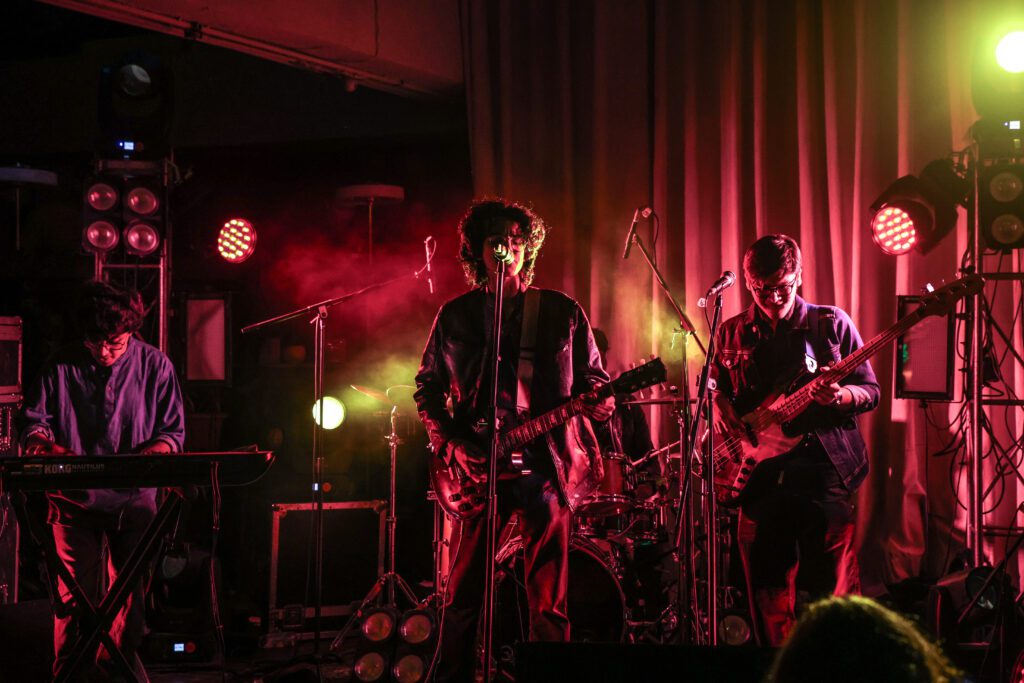
Priyansh : Right now, we are literally aiming for the minimum. We are aiming to have an audience that loves us for our music. I would just like to play in front of people. I am not even quoting a peripheral number. I just want to celebrate music.
Jaiditya : We are looking to build an audience that would assemble for us in three days. There is a lot of feedback when you are playing in front of an audience. At a very primitive level, you can smell the crowd, you can hear the crowd. When you are in a room with the crowd, it is hot because the crowd is breathing in that space. That is just something that motivates us. It would be cool to experience that a little more intensely, with bigger crowds.
13. Lastly, tell me a little about your upcoming projects. Is an EP/Album on the horizon, or will you be releasing singles for now?
Priyansh : We already have an album. The songs are done. The problem here is that albums don’t really work in 2024, especially for rock musicians, they really don’t. We have some schedules planned, we have some singles out, and we are promoting them however we can. We do have a lot of songs and albums planned out, and I won’t lie there has been a lot of slacking on all our parts.
Jaiditya : When it comes out, it is going to knock your socks off. But as Priyansh said, from a business perspective, there is really no point in putting out a full-length long play or album right now. I think the purpose an album serves, artistically, is that when you release some songs as an album, they cement those songs into a moment in time. If we put out an album next year, that would be a reflection of us in New Delhi, in 2025. That is the purpose of an album, I think — when you listen to all those songs together, you feel like those songs were written at a certain point in the band’s history, however long that history turns out to be. The sole aim is to make music and put out music. Everything else is secondary, and we will take it as it comes. If bad stuff happens, we will face it head on. We are not afraid.
Delhivision’s new single, Hustler, comes out soon.






